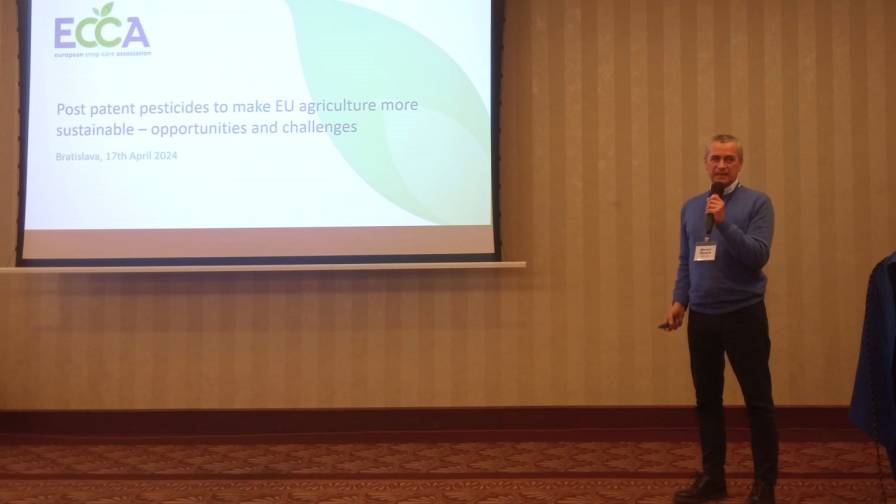Bayer Responds to Declining Bee Population Concerns
Leverkusen, Germany – In a move to address the problem of shrinking bee populations that research has linked to seed insecticide exposure, Bayer is debuting a “Bee Care Program” to promote the health of the insects and opening two centers devoted to the project in Germany and the US.
“At Bayer we take our responsibility to bee health very seriously,” said Sandra Peterson, Chief Executive Officer of Bayer CropScience, in a statement. “We make great efforts to ensure that our products can be used in a bee-responsible manner. We do this through researching and extensive testing of our products, thorough risk assessment and the focused stewardship measures we have put in place. Our plans to establish these two Bayer Bee Care Centers further underline our commitment to global bee health.”
Bayer’s center in Monheim, Germany will employ a full-time team of specialists, including two experienced beekeepers. It will host meetings and workshops to bring together beekeepers, farmers, research institutions, educational professionals and others concerned with the health and welfare of bees. “Additional activities will be progressively rolled out by the program, including educational projects and bee health promotion schemes such as the planting of flowers and natural habitat which is essential for bees to thrive.” It will open a second center in North Carolina later this year.
As honey bees are critical to the pollination of many food crops, colony losses have pushed the role of insecticides to a focal point in the debate. Purdue University researchers recently linked insecticides to bee deaths in research findings published in January.
The US is losing about one-third of its honey bee hives each year, according to Greg Hunt, a Purdue professor of behavioral genetics, honey bee specialist and co-author of the findings. Hunt said no one factor is to blame, and “scientists believe that others such as mites and insecticides are all working against the bees, which are important for pollinating food crops and wild plants.”
Purdue’s analyses of bees found dead in and around hives from several apiaries over two years in Indiana showed the presence of neonicotinoid insecticides – commonly used to coat corn and soybean seeds before planting. The insecticides were present at high concentrations in waste talc that is exhausted from farm machinery during planting.
The insecticides clothianidin and thiamethoxam were also consistently found at low levels in soil for up to two years after treated seed was planted on nearby dandelion flowers and in corn pollen gathered by the bees, according to the findings released in the journal PLoS One.
“We know that these insecticides are highly toxic to bees; we found them in each sample of dead and dying bees,” Christian Krupke, Purdue associate professor of entomology and a co-author of the findings, said in a statement.
DECLINE ‘DUE TO A NUMBER OF FACTORS’
As many experts, including the Purdue researchers, point out, the reasons for declining bee populations could be complex and multifaceted. “Although the global number of bee colonies increased by approximately 45% over the last half century,” Bayer explains, “the decline in Europe and North America over recent years due to a number of factors including diseases, parasites, extreme climatic and environmental factors and also certain agricultural and apicultural practices is concerning.”
Bayer says the bee care centers will serve as a scientific and communication platform to consolidate bee health projects from Bayer companies in cooperation with external partners. It believes the collaboration is essential to finding sustainable solutions to improve honey bee health. “The Bee Care Program and the establishment of the Bee Care Centers will bring Bayer`s extensive experience and knowledge in bee health under one roof and will ensure that dedicated resources for bee health are available,” Dr. Wolfgang Plischke, member of the Bayer AG Board of Management responsible for Innovation, Technology and Environment, said in a statement.
“For more than 25 years Bayer has played a leading role in securing bee’s health with proven products to control the varroa mite – a parasite which transmits pathogenic viruses and is considered to be one of the most significant factors in losses of honey bees in Europe and North America,” added Dr. Jean-Luc Lowinski, Managing Director of Bayer Animal Health. “In addition, we are developing further products and exploring technological solutions which will complement our current portfolio to ensure improved honey bee health.”
Purdue’s Krupke and Hunt received reports that bee deaths in 2010 and 2011 were occurring at planting time in hives near agricultural fields. Toxicological screenings performed by Brian Eitzer, co-author of the study from the Connecticut Agricultural Experiment Station, for a variety of pesticides showed that the neonicotinoids used to treat corn and soybean seed were found in each sample of affected bees. According to Krupke, other bees at those hives exhibited tremors, uncoordinated movement and convulsions – all signs of insecticide poisoning.
Seeds of most annual crops are coated in neonicotinoid insecticides for protection after planting. All corn seed and about half of all soybean seed is treated. The coatings are sticky, and in order to keep seeds flowing freely in the vacuum systems used in planters, they are mixed with talc, Purdue said. Excess talc used in the process is released during planting and routine planter cleaning procedures.
“Given the rates of corn planting and talc usage, we are blowing large amounts of contaminated talc into the environment. The dust is quite light and appears to be quite mobile,” Krupke said.
The corn pollen that bees were bringing back to hives later in the year tested positive for neonicotinoids at levels roughly below 100 parts per billion, he noted.
(Sources: Bayer and Purdue University)






